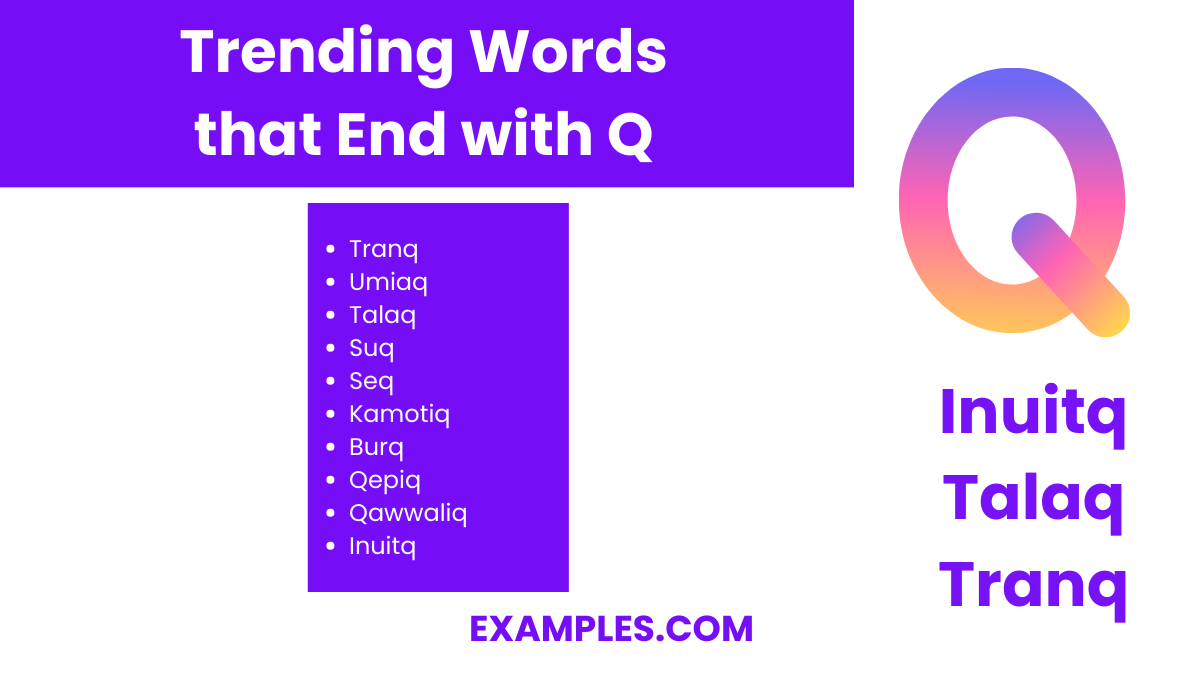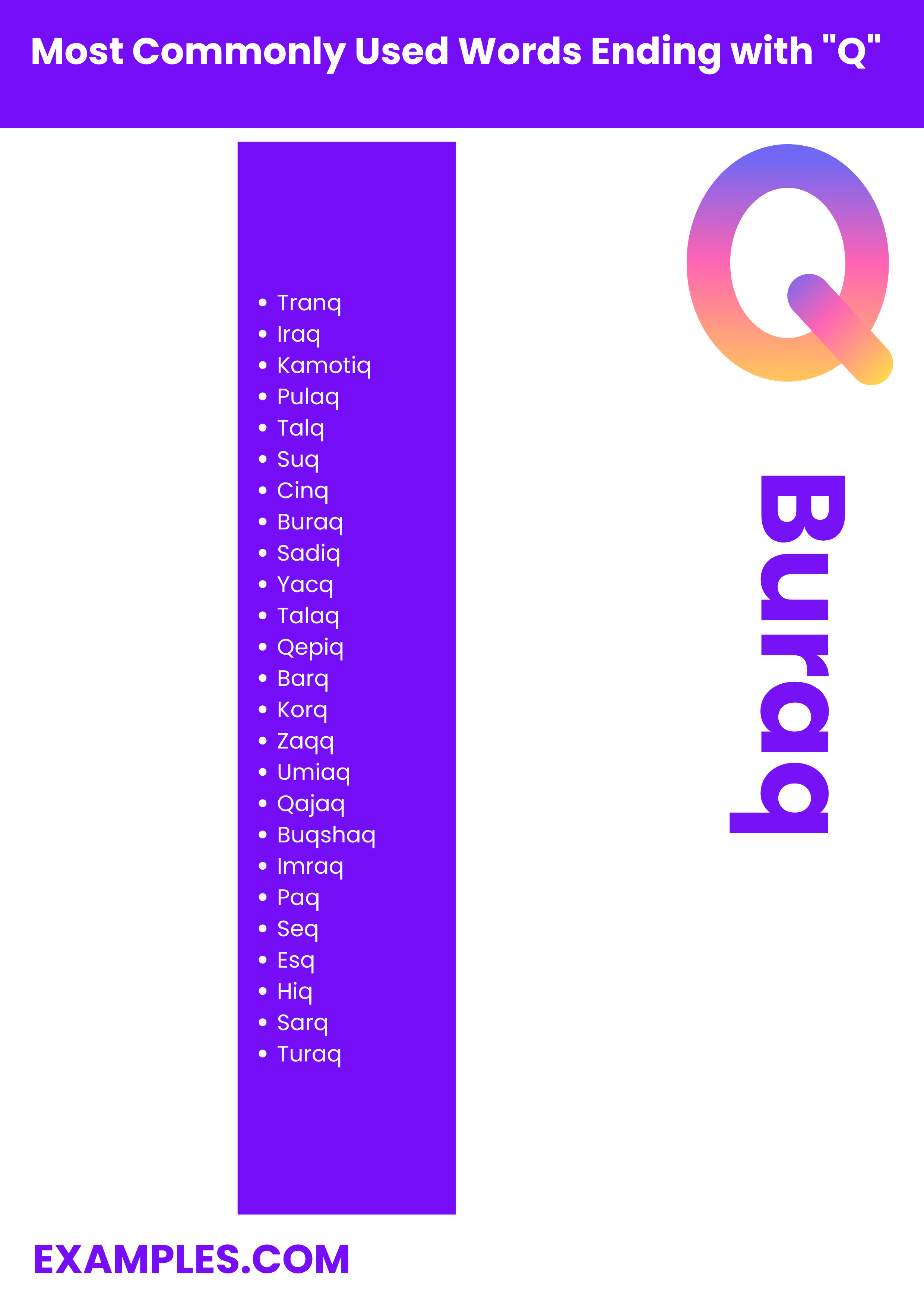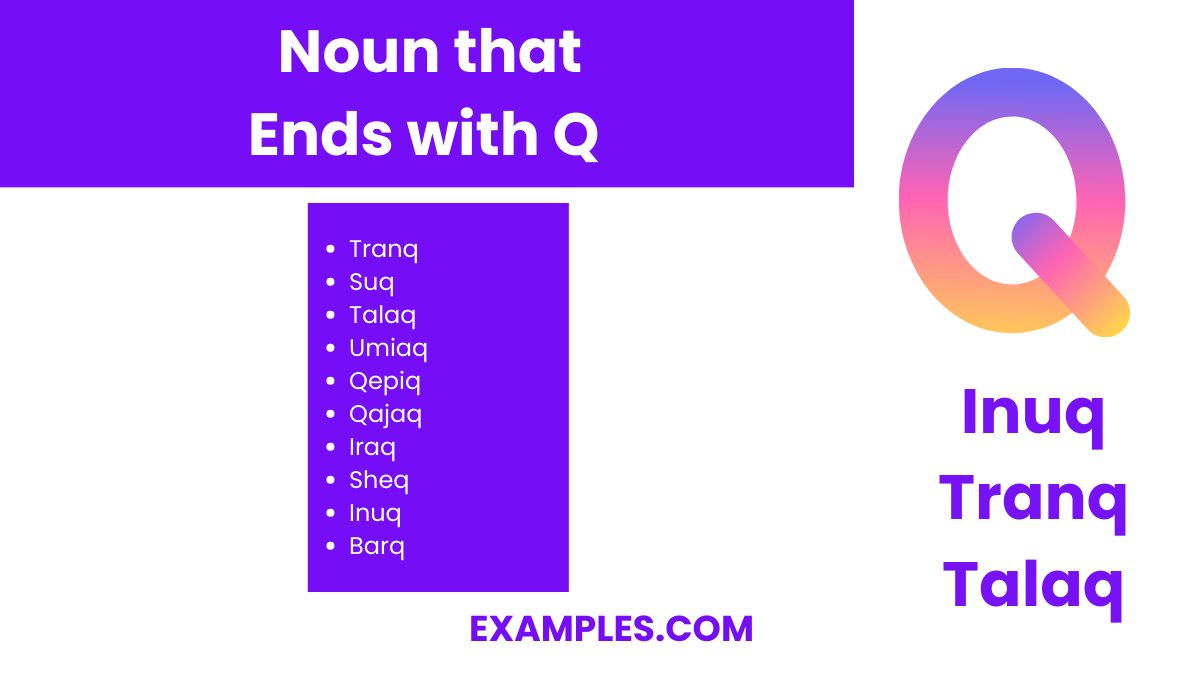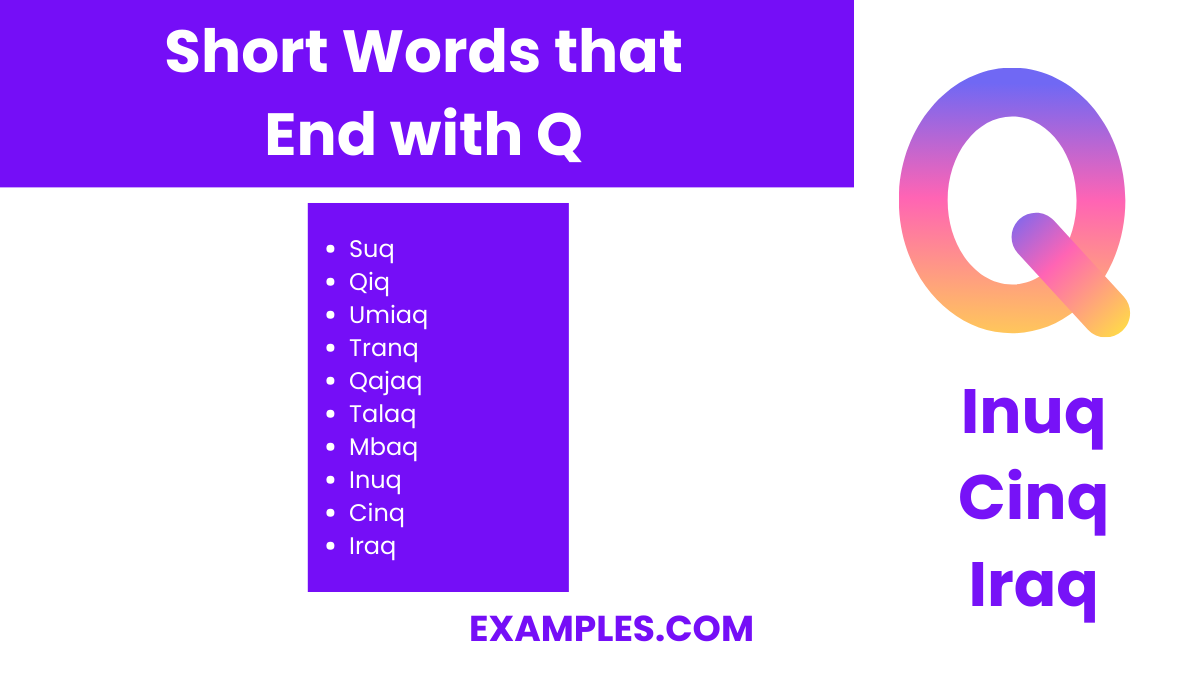Words ending with ‘Q’ unveils a linguistic treasure trove, ripe for exploration in the educational landscape. These unique words, though sparse within the English lexicon, hold a special allure for language enthusiasts and educators alike. Their rarity and distinctive phonetics make them intriguing subjects for vocabulary expansion, offering students a glimpse into the diverse tapestry of English. For teachers seeking to broaden their instructional repertoire and captivate their students’ linguistic curiosity, integrating these ‘Q’ words ending can add an element of challenge and novelty to language lessons, fostering a deeper engagement with the intricacies of English. This exploration not only enriches vocabulary but also encourages a broader appreciation for the language’s vast and varied character.
Download Most Commonly Used Words Ending with Q -PDF
| 5 Letter Words With Q | 6 Letter Words with Q | 7 Letter Words With Q |
| 8 Letter words with Q | 9 Letter Words With Q | 10 Letter Words With Q |
| Words Starting with Q | Words With Letter Q in Middle | Q Silent Words |
25 Most Commonly Used Words Ending with “Q”
The English lexicon, celebrated for its breadth and variety, occasionally presents the linguistic curiosity of words terminating in “Q.” While these words may not frequently surface in daily dialogue, they carry distinct significances, often rooted in specialized disciplines like science, technology, and diverse cultural traditions. The scarcity of words concluding with ‘Q’ imbues them with a particular intrigue. Herein, we unveil a compilation of 50 such words, each ending with the enigmatic ‘Q.’ Presented in a tabular overview, these terms traverse a spectrum of fields, embodying the eclectic essence of the English language. Including Rhyming Words in this exploration enhances phonetic awareness, while integrating Sight Words facilitates recognition skills, together offering a comprehensive approach to linguistic exploration.
| Tranq | Suq | Talaq | Umiaq | Seq |
| Iraq | Cinq | Qepiq | Qajaq | Esq |
| Kamotiq | Buraq | Barq | Buqshaq | Hiq |
| Pulaq | Sadiq | Korq | Imraq | Sarq |
| Talq | Yacq | Zaqq | Paq | Turaq |
Trending Words that End with “Q”

The English language, with its vast diversity, occasionally presents us with the unique charm of words ending in ‘Q.’ Although rare, these words possess a distinct character and find their place in various niches, from literary expressions to academic discourse, adding a unique flair to the text. Grasping the essence of these words not only broadens one’s vocabulary but also offers a window into the intricate evolution of language. This compilation focuses on 30 trending words concluding with ‘Q,’ providing insights into their meanings and contexts of use, enriching everyday communication and understanding of language dynamics. Highlighting Daily Use English Words and understanding the singular & plural words of these ‘Q’-ending words can significantly enhance linguistic proficiency.
- Tranq – A slang term often used to refer to tranquilizers.
- Umiaq – A traditional, large Inuit boat, made of sealskin and used for transport.
- Talaq – A term in Islamic law referring to divorce, often used in the context of “triple talaq.”
- Suq – Another term for a marketplace or bazaar in Arab cities.
- Seq – An abbreviation used in various technical fields, including biology, to denote a sequence.
- Kamotiq – A type of sled made by the Inuit people.
- Burq – A variant spelling of burqa, a garment covering the body, often worn by women in some Islamic traditions.
- Qepiq – A currency unit in Azerbaijan (1/100th of a manat).
- Qawwaliq – Refers to a form of Sufi devotional music popular in South Asia.
- Inuitq – Referring to the Inuit people or their language.
- Halaq – In Islamic context, it refers to the act of shaving the head, especially during the pilgrimage.
- Esroq – An uncommon word, occasionally used in specialized contexts.
- Niqab – A garment that covers the face, worn by some Muslim women.
- Barq – A rare word, occasionally appearing in historical or cultural texts.
- Tariq – A male name of Arabic origin, meaning ‘morning star’.
Noun That Ends with “Q”
The English language, with its vast expanse, occasionally presents the rare occurrence of noun words ending in ‘Q.’ These unique nouns add a layer of intrigue and richness to the linguistic landscape, making them valuable for vocabulary enhancement. Educators aiming to deepen their students’ engagement with English can leverage this collection of nouns ending in ‘Q’ to broaden their linguistic knowledge. This exploration not only diversifies vocabulary but also sparks interest in the etymological roots and cultural origins of words. Here, we explore a selection of 10 such nouns, each concluding with the distinctive ‘Q,’ serving as a fascinating focus for language lessons. Incorporating Difficult Words challenges students, while Encouraging Words motivates and builds confidence in navigating the complexities of English.
- Tranq – Short for tranquilizer, a drug used to reduce anxiety or induce sleep.
- Suq – A marketplace in Arab cities; a bazaar or market in Western Asia or North Africa.
- Talaq – A form of divorce under Islamic law.
- Umiaq – A large, open Inuit or Eskimo boat, made of wood frames covered with animal skins.
- Qepiq – A monetary unit in Azerbaijan.
- Qajaq – A variant spelling of ‘kayak,’ a small, narrow watercraft traditionally used by the Inuit.
- Iraq – A country in Western Asia, known for its rich history and cultural heritage.
- Sheq – A variant of shekel, a unit of currency in ancient and modern Israel.
- Inuq – Singular form of Inuit, referring to a member of the indigenous people inhabiting the Arctic regions of Greenland, Canada, and Alaska.
- Barq – A variation of ‘bark’, a type of sailing ship with three or more masts.
- Buraq – In Islamic tradition, a heavenly steed that carried the Prophet Muhammad during the Night Journey.
- Kalpaq – A traditional high-crowned cap worn in Central Asia.
- Roq – An alternative spelling for roc, a mythical bird of enormous size and strength.
- Tarboosh – A type of tasseled cap, typically red, worn in many Middle Eastern countries, similar to a fez.
Short Words that End with “Q”
The English language, with its vast expanse, occasionally presents the rare occurrence of noun words ending in ‘Q.’ These unique nouns add a layer of intrigue and richness to the linguistic landscape, making them valuable for vocabulary enhancement. Educators aiming to deepen their students’ engagement with English can leverage this collection of nouns ending in ‘Q’ to broaden their linguistic knowledge. This exploration not only diversifies vocabulary but also sparks interest in the etymological roots and cultural origins of words. Here, we explore a selection of 10 such nouns, each concluding with the distinctive ‘Q,’ serving as a fascinating focus for language lessons. Incorporating Difficult Words challenges students, while Encouraging Words motivates and builds confidence in navigating the complexities of English.
- Suq – An alternative spelling for souk, a marketplace in Arab cities.
- Qiq – A rare term, possibly used in regional dialects or specific cultural contexts.
- Umiaq – A type of large, open Inuit boat.
- Tranq – Short for tranquilizer, commonly used in medical contexts.
- Qajaq – An Inuit kayak, showcasing the linguistic diversity of indigenous cultures.
- Talaq – A term in Islamic law for a form of divorce.
- Mbaq – A less common word, potentially specific to certain dialects or languages.
- Inuq – Referring to an individual Inuit person.
- Cinq – The French word for ‘five,’ often used in English in certain expressions.
- Iraq – The name of a country in Western Asia, known for its rich history.
- Barq – A less common term, possibly used in specific dialects.
- Piqaq – A term with unclear definition, potentially a word from a specific dialect or regional language.
In conclusion, words ending with ‘Q’ offer a unique and enriching addition to the English language, providing an excellent resource for teachers. To effectively incorporate these words into learning, encourage exploration of their origins and usage in context. Emphasizing these distinctive words can enhance students’ vocabulary, cultural understanding, and appreciation for linguistic diversity, making language learning a more engaging and comprehensive experience.






